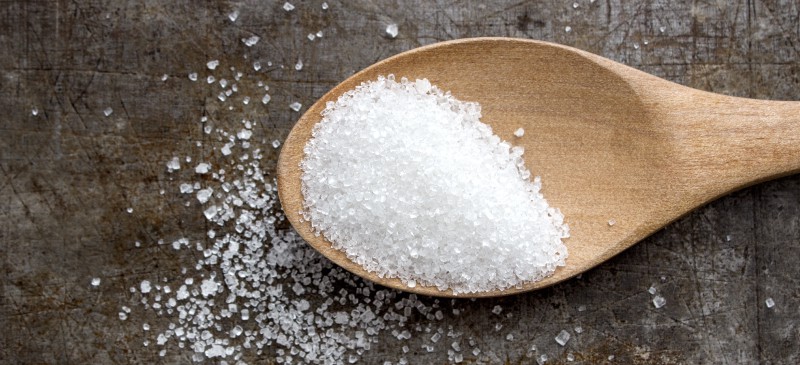
Erythritol is now one of the most popular “natural” zero-calorie sweeteners available. What is erythritol exactly, and is it safe to consume on a regular basis?
Because it’s seemingly less problematic than the controversial artificial sweetener called aspartame, it makes sense that more and more people are choosing erythritol in hopes of decreasing added sugar in their diets.
You’ll commonly find it in products like low-sugar, sugar-free and even no-carb foods, and while it’s generally safe, there are some common erythritol side effects to consider as well. For example, when used in large amounts, erythritol consumption can potentially cause negative reactions like nausea and stomach upset.
The reason why it doesn’t provide calories or sugar to its consumer is because the body actually can’t break it down! That’s right — studies show that even though erythritol travels through your body, it doesn’t get metabolized.
Another issue is that it’s often made from GMO cornstarch.
So is erythritol safe and a smart sugar substitute? Below we’ll cover both the pros and cons of using it in place of other sweeteners.
What Is Erythritol?
Erythritol is a natural sugar alcohol, just like xylitol. Sugar alcohols are carbohydrates that chemically have characteristics of both sugars and alcohols.
There are nearly zero carbs and zero calories per gram of erythritol.
Erythritol was first discovered in 1848 by a Scottish chemist named John Stenhouse. Japan has been using erythritol since the early 1990s in candies, jellies, jams, chocolate (including the common chocolate bar), yogurt, beverages and as a natural sugar substitute, and it’s gained popularity in the U.S. more recently.
Although the name can be confusing, “sugar alcohols” have nothing to do with cocktails, since they don’t contain ethanol (aka alcohol) like alcoholic beverages. Other sugar alcohols include:
- sorbitol/glucitol
- lactitol
- isomalt
- maltitol
- mannitol
- glycerol/glycerin
- xylitol
Once erythritol enters your body, it’s rapidly absorbed in the small intestine and bloodstream with only about 10 percent entering the colon. The other 90 percent is excreted in the urine.
It essentially goes through your system untouched with zero metabolization.
Is It Safe?
How safe is erythritol? As of 1997, erythritol has earned the status of “generally recognized as safe” by the U.S. Food and Drug Administration.
The food industry and consumers love it because it has a similar sweet taste as sugar, but it’s noncaloric and does not raise blood sugar levels.
Although there are some concerns with sugar alcohols, studies thus far suggest that erythritol is unlikely to do any more harm when consumed in normal amounts.
Research shows that it’s rapidly absorbed in the small intestine but poorly metabolized, and it may not carry the same health benefits as other natural sweeteners that serve as sugar substitutes — such as monk fruit or raw honey.
In order to avoid potential side effects, it’s recommended that adults consume no more than 0.45 grams of erythritol per pound of body weight per day (or one gram of erythritol per kilogram of body weight), which would be 68 grams of erythritol for someone weighing 150 pounds. This equates to about 5.5 tablespoons of erythritol added to foods throughout the day.
Nutriton Facts:
This product is a four-carbon sugar alcohol or polyol that contains about 60 percent to 80 percent of the sweetness of table sugar.
Technically, there are about 0.25 calories per gram of erythritol (so less than one calorie, which is considered to be basically zero). Table sugar in comparison contains about 4 calories per gram, meaning it has 16 times more calories.
To be clear, just because a sweetener doesn’t have calories and doesn’t appear to affect blood sugar, it does not mean that it’s necessarily good for your health.
Risks and Side Effects
Why is erythritol bad for you, according to some research? Below are the major concerns with sugar alcohols, including erythritol.
1. Usually Genetically Modified
The World Health Organization defines genetically modified organisms (GMOs) as “foods derived from organisms whose genetic material (DNA) has been modified in a way that does not occur naturally, e.g. through the introduction of a gene from a different organism.”
Although there are non-GMO varieties available, much of the erythritol used in foods and beverages today is derived from cornstarch from genetically modified corn.
While this is still a controversial topic with ongoing research, animal studies have linked consumption of GMOs with potential problems, such as:
- infertility
- immune problems
- accelerated aging
- faulty insulin regulation
- changes in major organs and gastrointestinal system
2. Commonly Combined with Artificial Sweeteners
Erythritol is not as sweet as sugar on its own, so it’s often combined in foods and beverages with other questionable sweeteners, usually ones that are artificial.
When combined with artificial sweeteners like aspartame, the erythritol-laden product can become even more troublesome for your health. For example, possible erythritol side effects when combined with aspartame may include:
- anxiety
- short-term memory loss
- fibromyalgia
- weight gain
- fatigue
- more
3. Can Cause Gastrointestinal Problems
Sugar alcohols pass through your body essentially untouched, much like dietary fiber does. This is why they can produce abdominal gas, bloating and diarrhea in some individuals — as they are not completely absorbed by the body and are fermented by bacteria in the large intestine.
The good news, however, is that compared to other sugar alcohols, erythritol seems less likely to ferment in the gut and less likely to trigger digestive issues.
Some of the most common erythritol side effects are undesirable gastrointestinal side effects that children are especially susceptible to.
Unfortunately, the gastrointestinal issues don’t necessarily stop at some rumbling in your stomach. Diarrhea is a well-known common erythritol side effect, although less so than with xylitol.
Especially when consumed in excess, unabsorbed erythritol can attract water from the intestinal wall and cause diarrhea.
The likelihood of diarrhea appears to be even greater when erythritol is consumed along with fructose. Diarrhea might sound harmless, but it can lead to dehydration, electrolyte imbalances and malnutrition.
When consumption is high (50 grams or more per day), digestive upset — including gas, cramping, bloating, stomachaches and diarrhea — becomes even more likely. One study specifically showed that the intake of 50 grams of erythritol caused stomach rumbling and nausea.
For this reason, it’s important to keep intake in moderation to help prevent negative side effects and consider scaling back if digestive issues occur.
In terms of impacting one’s microbiome, one study found that erythritol plus stevia had no negative impact on bacterial growth in the gut, however ingestion did cause some changes to the gut microbial structure and diversity.
4. May Trigger Allergic Reactions
Although very rare, erythritol can cause an allergic skin reaction in some people, as demonstrated in a study published in 2000 in the Journal of Dermatology.
A 24-year-old woman developed a severe rash and “wheals” all over her entire body after having one glass of a beverage sweetened with erythritol. A wheal, often called a welt or hives, is a raised, itchy area of skin that’s sometimes an obvious sign of an allergy to something you’ve consumed or come in contact with.
5. Not Safe for Dogs/Pets
Sugar alcohols shouldn’t be given to dogs because this can cause severe reactions. Even small amounts of sugar alcohols can cause hypoglycemia (low blood sugar), seizures, liver failure or even death in dogs.
Symptoms of poisoning develop rapidly in dogs after ingesting sugar alcohols, usually within 15–30 minutes of consumption. Call your veterinarian if your pet has consumed any product containing sugar alcohols, such as gum, candy, etc.
Potential Benefits
What is erythritol potentially beneficial for? Here are some of the reasons why people choose to use it as a sugar substitute:
READ RELATED: Farro: the Fiber-Rich Ancient Grain
1. Sugar-Free and May Help with Blood Sugar and Weight Management
Fans of this sweetener mainly love it because of its lack of calories, which can be helpful for weight management.
Erythritol is also suitable for diabetics and people following the keto diet and other low-carb diets.
Findings from a 2018 study suggest that erythritol may not only serve as a glucose substitute, but also may be a useful agent in the treatment of diabetes to help manage postprandial blood glucose levels. A 2020 review also stated that there’s potential to use sugar alcohols as anti-diabetic supplements in diabetic foods and food products.
Replacing sugar with erythritol while doing keto can help keep your carbs in check and aid in you staying in ketosis.
All of that said, there is the possibility that consumption in high amounts may actually cause metabolic changes that are not beneficial for weight management. Once 2017 study, for example, found an association between erythritol and weight gain in young men, although the exact reasons why are not yet understood.
2. Can Help Increase Satiety and Satisfaction
Some studies show that erythritol could influence the release of certain hormones in the gut and even slow the emptying of the stomach. It can also improve the mouthfeel of low-sugar foods and mask unwanted aftertastes that other intense sweeteners often have.
3. Better for Teeth than Other Sweeteners
Studies have been mixed, but some say that erythritol can decrease plaque or even help prevent tooth decay because sugar alcohols do not react with plaque bacteria in the mouth in the way that sugar does. According to the Food Insight Organization, erythritol inhibits the growth of a specific type of oral bacteria (Streptococcus mutans) known to be associated with cavities.
One double-blind, randomized trial study looked at the effects of erythritol on 485 primary school children. Each child consumed four erythritol, xylitol or sorbitol candies three times per school day.
In the follow-up examinations, researchers observed a lower number of cavities in the erythritol group than in the xylitol or sorbitol groups. The time until the development of cavities was also longest in the erythritol group.
4. Possibly Has Antioxidant Effects
Some scientists say that this sweetener might provide antioxidants and have the ability to improve endothelial function in people with type 2 diabetes while also supporting cardiovascular health in other ways.
In one study conducted on diabetic rats, erythritol seemed to act as an antioxidant (to fight free radicals) and potentially offered protection against hyperglycemia-induced vascular damage.
Sources
Fruits like watermelon, pear and grapes naturally contain minor amounts of erythritol, as do mushrooms and some fermented foods like cheese, wine, beer and sake.
Erythritol is now commonly added to many packaged foods, snacks and drink items. Some examples of where you’ll find it include:
- zero-calorie and/or diet sodas and drinks
- sports and energy drinks
- sugar-free gums and mints and other sweets (such as hard and soft candies, flavored jam, and jelly spreads)
- chocolate products
- frostings
- dairy desserts (such as ice cream, other frozen desserts and puddings)
- packaged grain-based desserts (such as cakes and cookies)
- even some medications
Erythritol is commonly used in combination with artificial sweeteners to improve the taste of products. If you’re a label reader (and I hope you are!), you may have noticed alternative sweeteners like sucralose and erythritol becoming more prominent in ingredient lists lately, especially in energy/sports drinks and chocolate bars.
In addition to providing a sweet taste, sugar alcohols in food add bulk and texture, help retain moisture, and prevent browning.
Because erythritol is not hygroscopic (does not absorb moisture from the air), it’s popular in certain baked products because it doesn’t dry them out.
Related: Oligosaccharides: The Prebiotics that Support the Heart & Gut
How It’s Made/Types
As explained above, erythritol does occur naturally in some fruits and fermented foods. However, the problem is that the grand majority of erythritol used in products today is man-made by taking glucose (most commonly from GMO cornstarch) and fermenting it with a yeast called Moniliella pollinis.
The type that is added to food and beverages today is typically man-made from GMO cornstarch, resulting in an ultra-processed food — very far from a natural sweetening agent. It’s one of those “invisible GMO ingredients.”
Erythritol is available as a granulated or powdered, natural zero-calorie sweetener. Examples of such products include Zsweet and Swerve (which is non-GMO certified and sourced from France).
Powdered erythritol is often used like confectioner’s sugar and said to have “‘no bitter or chemical aftertaste.”
When you purchase organic erythritol, this ensures the product cannot be made from a GMO source, such as cornstarch.
Erythritol vs. Stevia
Are stevia and erythritol the same thing? Stevia is a different type of sugar sub.
It’s an herbal plant that belongs to the Asteraceae family. The stevia plant has been used for over 1,500 years by the Guaraní people of Brazil and Paraguay.
These two sweeteners are often combined in order to increase volume and reduce aftertaste.
Is erythritol healthier than stevia?
Some health experts have stated that they personally prefer stevia leaf extract because it doesn’t spike blood sugar and is associated with some health benefits. According to research studies, these may include improvements in cholesterol, blood pressure and even some types of cancer.
Overall, stevia seems to be a health-promoting choice when you buy a high-quality, pure stevia leaf extract product. Make sure to buy stevia without additives.
Green stevia is said to be one of the best options if you can find it.
Xylitol vs. Erythritol
Both of these products are sugar alcohols (also called reduced-calorie sweeteners). The main difference is that xylitol does contain some calories (it’s not zero-calorie like erythritol) but less than sugar.
Xylitol also has a small impact on blood sugar levels while erythritol does not.
It is found naturally in some fruits and vegetables and has a similar taste, texture and volume as sugar. One drawback to using xylitol is that it can cause diarrhea in some people, especially when used in large amounts.
This is one reason why some people prefer erythritol. On the other hand, benefits associated with xylitol include improvements in blood sugar management, dental health and even immunity against certain infections.
Related: Is Allulose Safe to Consume? Potential Benefits & Risks of This Sweetener
How to Purchase/Use
Where can you buy erythritol? Look for it in health food stores, major grocery stores or online.
If you purchase a product that has erythritol, how do you know if it’s a GMO-free? The product needs to have a USDA Organic or a Non-GMO Project-certified insignia on the packaging.
Erythritol Substitutes/Alternatives:
Remember that many erythritol substitutes are available if you can’t find any or if you prefer a different product because you’re experiencing erythritol side effects. These include stevia, monk fruit, honey, molasses and maple syrup if you don’t mind consuming actual sugar and calories.
- Raw honey — This is a pure, unfiltered and unpasteurized sweetener made by bees from the nectar of flowers. Unlike processed honey, raw honey does not get robbed of its incredible nutritional value and health powers. It has been scientifically proven to help with allergies, diabetes, sleep problems, coughs and wound healing. Look for a local beekeeper to source your raw honey. This makes it even more likely to help with seasonal allergies.
- Monk fruit — This product is now recommended for the same reasons as stevia. It’s a fruit-derived sweetener that has been used for hundreds of years. Many find that it has a pleasant taste without bitterness. Monk fruit contains compounds that, when extracted, are natural sweeteners 300–400 times sweeter than cane sugar — but with no calories and no effect on blood sugar. Just make sure that the monk fruit product you purchase doesn’t contain any GMO-derived erythritol or other unhealthy additives.
Conclusion
- What is erythritol? It’s a zero-calorie sweetener that is commonly man-made from genetically modified corn products.
- Is erythritol safe? While the FDA considers it to be generally safe, there are some potential erythritol side effects to consider. Even if it’s not GMO, it may cause possible gastrointestinal distress and allergic reactions in certain individuals who may be sensitive to its effects.
- When used as a sugar substitute, it might have some health benefits, and non-GMO varieties do seem to be fine in moderation. Potential benefits include help managing blood sugar and weight, supporting dental health, and providing antioxidant effects.
- There are plenty of other natural, health-promoting sweeteners available that can also be used in moderation instead to cut down on your sugar intake — such as stevia, monk fruit and raw honey.
Source: Dr. Axe | Nutrition





